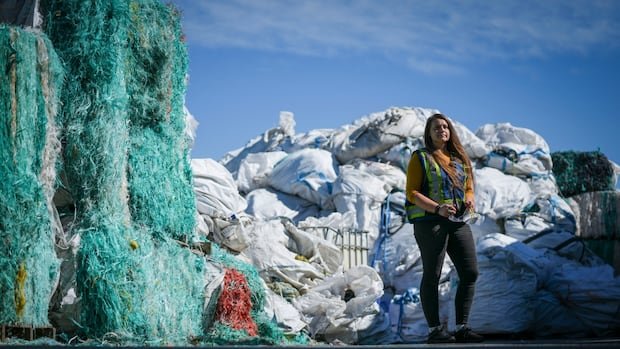At a bustling recycling warehouse, Chloé Dubois oversees a bag filled with numerous small plastic pellets. These pellets, originally fishing ropes and nets, are now being repurposed to combat marine plastic waste in Canadian waters.
Dubois, the co-founder and executive director of the Ocean Legacy Foundation in British Columbia, leads Canada’s pioneering marine waste recycling program. Addressing the urgent issue of plastic pollution, she emphasizes the importance of preserving biodiversity both domestically and internationally through effective waste management practices.
However, recent government budget cuts are jeopardizing the program’s continuity. While Ocean Legacy generates some income by selling the pellets to plastic manufacturers, its financial stability has been historically supported by funding from provincial and federal clean-up initiatives like the Ghost Gear Fund, which has not been renewed this year.
The cessation of funding has not only affected Ocean Legacy but has also impacted the wider ocean cleanup community, leading to job layoffs in various organizations involved in environmental restoration efforts.
The significant problem of ghost gear, which refers to abandoned or lost fishing equipment, poses a grave threat to marine life worldwide. The United Nations Environment Programme reports that approximately 640,000 tons of gear are discarded into oceans annually, endangering species like whales, seals, turtles, and fish through entanglement and subsequent harm.
Ocean Legacy’s innovative recycling process involves collecting marine plastics primarily from Nova Scotia and New Brunswick. The waste, ranging from fishing nets to ropes, is meticulously sorted, melted, and transformed into pellets for resale to manufacturers. These pellets are then utilized to create a range of products, from patio furniture to lumber-like boards, promoting sustainable practices in various industries.
The organization’s future expansion plans include establishing a recycling facility on the East Coast to address the pressing need for nationwide marine waste recovery programs. Despite the challenges posed by dwindling government support, Dubois remains steadfast in her commitment to advancing marine conservation efforts across Canada.
As funding cuts threaten the continuity of essential ocean cleanup projects, collaboration between stakeholders, including Indigenous harvesters and the fishing industry, is crucial to addressing and preventing ghost gear pollution in Canadian waters.
Dubois acknowledges the urgent need to diversify revenue streams for Ocean Legacy, exploring potential ventures such as tug and barge services or online education to ensure the organization’s operational sustainability. While plastic recycling initiatives are vital, environmental advocates stress the paramount importance of stringent regulations to curb excessive plastic production and waste generation, emphasizing the need to reduce single-use plastics to safeguard our oceans for future generations.

